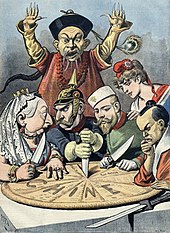Imperialism Definition Ap World History
During the period 1750 to 1900, industrialization and the growth of capitalism brought with it new methods of obtaining economic prosperity and growth. During the 1800s, land outside of Europe was dominated by European imperialism The term imperialism is defined as the policy of extending a country's power and influence by exploiting another country through diplomacy or military force for economic gain. Essentially, when a country imperializes another territory, it takes over either economically or by force and acquires land. Imperialism was most rampant in Africa, where European countries were running left and right to grab any land they could.

Resources:
^^ A well known political comic displaying European powers (and Japan) splitting up China for imperialism ^^
Motives for Imperialism
Imperialism was spurred by six key motives that can be remembered with the acronym, EMPIRE .
Resources:
Exploratory
Imperialists were motivated to:
- Map new territory. 🗺️
- Explore new lands for science and adventure. 🧭
- Locate indigenous people.
- Identify available resources (plants, animals, etc.). 🌾
Exploring new lands was a glorious achievement for imperialists and their country.
Resources:
Military
Imperialists were motivated to:
- Keep other imperialists from taking resources from other imperialized people. ⚔️
It is important to note that the (M) of EMPIRE is often simply used as a placeholder since militaristic motives align with (P).
Political
Imperialists were motivated to:
- Assert themselves as powerful and prestigious. 💪
- Make sure their country had the most resources. 💎
- Control another country's government. ⚖️
- Claim land for the "mother country." 🇬🇧
Political motives correlated heavily with Europe's growing sense of nationalism, pride, and identity.
Ideological
Imperialists were motivated to:
- "Improve" life for non-Europeans
- "Civilize" the "primitive cultures" of other countries. 🏹
- Spread westernization/make others more like Europeans.
- Have people adopt a European perspective. 👀
- Prove their culture and race were superior. (See The White Man's Burden by Rudyard Kipling) 👊
Social Darwinism was a driving force behind the imperialist movement. Europeans thought it was their duty to spread what they thought was superior culture and thinking.
Religious
Imperialists were motivated to:
- Convert natives to the Christian religion. ✝️
- Convince native people that their religion was wrong and "evil." ☠️
- Change the beliefs of the next generation. 👪
They wanted to "Christianize all the kingdoms" so to speak.
Economic
Imperialists were motivated to:
- Make money! 🤑
- Increase the factors of production (land, workers, capital, etc.). 💸
- Obtain raw materials to manufacture goods. (supply)🧵
- Expand new markets by getting natives to buy European goods and services.(demand)🛍️
Remember that imperialism starts up in conjunction with the Industrial Revolution.
Resources:
The Scramble for Africa
The Scramble for Africa refers to the epic land grabs of European nations throughout Africa (imperialism at its finest, or at its worst). In the minds of European countries, Africa was fair game and it was FULL of resources, raw materials, and luxury goods such as diamonds, that were all heavily sought after due to the rise in industrial production and increasing global trade. 💎
Resources:
The Berlin Conference 1884-1885
Competition among European nations had grown so severe something had to be done, rules had to be made, resulting in the Berlin Conference:
- Conference held in Berlin to determine the future of Africa. 🇩🇪
- Established rules for colonization.
- Drew borders for the European countries to follow, but were not adhered to by the local Africans. 🗺️
- No African representatives were invited.
Resources:
Effects
- Imperialism only continued to grow.
- By 1900, there were only 2 unclaimed territories in Africa: Ethiopia and Liberia.
- The borders established by Europeans ripped apart local tribes and led to many conflicts, setting the stage for future civil wars. ⚔️
- Hundreds of thousands of people became refugees.
Resources:
Imperialism Definition Ap World History
Source: https://fiveable.me/ap-world/-/imperialism-scramble-africa/blog/a96CL5YetRyn4Upkpmiy
0 Response to "Imperialism Definition Ap World History"
Post a Comment